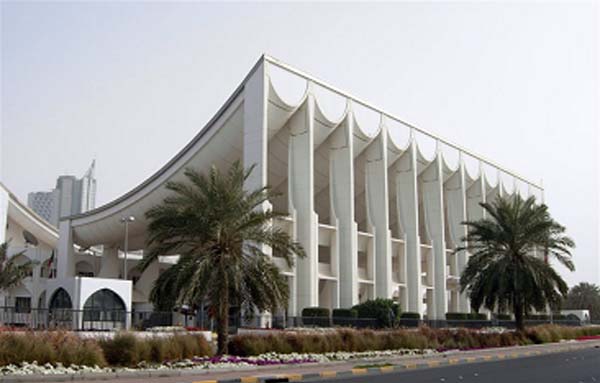
Democratic practice in Kuwait is imbued in the Kuwaiti entity itself.
His Highness Sheikh Sabah Al-Ahmad Al-Jaber Al-Sabah, Amir of the State of Kuwait, has reaffirmed Kuwait’s adherence to democracy when he said that “Democracy is deeply rooted in ourselves and is not imposed on us”. The Kuwaiti people have experienced democracy since a long time and it is viewed as a positive development in Kuwait’s march to peace and progress.
The institutionalization of democracy is deep rooted in the social structure of Kuwait. Indeed, Kuwait’s Parliamentary experience weaved its way through to the present form through gradual and steady development which characterized the growth of the Kuwaiti society and state system since its inception.
The Al-Sabah family, led by its patriarch, Sheikh Sabah 1, always adhered to consultation practice based on tribal traditions in his efforts to shape the destiny of Kuwait, as far back as 1752.
The Kuwaiti tradition encourages consultation and expression of ideas and opinions in Kuwaiti Diwaniyahs among the different segments of the society, irrespective of their social status. What emerged as a consensus had an impact on the formulation of State Policy which reflected popular will. Thus, the Diwaniyas, numerous in number, served as a defacto consultative body in the earlier days.
Popular will is reflected through the National Assembly elections in Kuwait.
Historically, elections in Kuwait go back to 1756 when the people of Kuwait unanimously elected Sheikh Sabah the First as the Head of State.
As Kuwait entered the 20th century, the need of the time brought about further development of the democratic institutions. Kuwait has known consultation system as the basis of government since 1920 when the first State Consultative Council, comprising of 21 prominent citizens, was formed during the reign of Sheikh Ahmed Al-Jaber. It was indeed a historical indicator of a serious attempt to create a democratic atmosphere.
This was followed by the Municipal Council comprising of 14 members of which 10 were elected by the people and the rest 4 were appointed. This Council made all types of decisions and recommendations.
In 1938, the first elected Legislative Assembly with 14 members was formed through general elections. This undoubtedly had a tremendous impact on the political life of the Kuwaitis. This was followed by the formation of the State Consultative Council.
After Kuwait gained absolute political independence on 19th. June 1961 through the termination of the January 1899 Friendship and Cooperation Treaty between Kuwait and Great Britain, new parliamentary life was initiated through the election of a Constituent Assembly that was entrusted with the task of framing the State’s constitution. Kuwait is a constitutional monarchy with the oldest directly elected parliament in the Arab Gulf region.
His Highness Sheikh Sabah Al-Ahmad Al-Jaber Al-Sabah, Amir of the State of Kuwait, has reaffirmed Kuwait’s adherence to democracy when he said that “Democracy is deeply rooted in ourselves and is not imposed on us”. The Kuwaiti people have experienced democracy since a long time and it is viewed as a positive development in Kuwait’s march to peace and progress.
The institutionalization of democracy is deep rooted in the social structure of Kuwait. Indeed, Kuwait’s Parliamentary experience weaved its way through to the present form through gradual and steady development which characterized the growth of the Kuwaiti society and state system since its inception.
The Al-Sabah family, led by its patriarch, Sheikh Sabah 1, always adhered to consultation practice based on tribal traditions in his efforts to shape the destiny of Kuwait, as far back as 1752.
The Kuwaiti tradition encourages consultation and expression of ideas and opinions in Kuwaiti Diwaniyahs among the different segments of the society, irrespective of their social status. What emerged as a consensus had an impact on the formulation of State Policy which reflected popular will. Thus, the Diwaniyas, numerous in number, served as a defacto consultative body in the earlier days.
Popular will is reflected through the National Assembly elections in Kuwait.
Historically, elections in Kuwait go back to 1756 when the people of Kuwait unanimously elected Sheikh Sabah the First as the Head of State.
As Kuwait entered the 20th century, the need of the time brought about further development of the democratic institutions. Kuwait has known consultation system as the basis of government since 1920 when the first State Consultative Council, comprising of 21 prominent citizens, was formed during the reign of Sheikh Ahmed Al-Jaber. It was indeed a historical indicator of a serious attempt to create a democratic atmosphere.
This was followed by the Municipal Council comprising of 14 members of which 10 were elected by the people and the rest 4 were appointed. This Council made all types of decisions and recommendations.
In 1938, the first elected Legislative Assembly with 14 members was formed through general elections. This undoubtedly had a tremendous impact on the political life of the Kuwaitis. This was followed by the formation of the State Consultative Council.
After Kuwait gained absolute political independence on 19th. June 1961 through the termination of the January 1899 Friendship and Cooperation Treaty between Kuwait and Great Britain, new parliamentary life was initiated through the election of a Constituent Assembly that was entrusted with the task of framing the State’s constitution. Kuwait is a constitutional monarchy with the oldest directly elected parliament in the Arab Gulf region.

